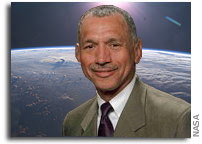Message from the Administrator NASA and the Importance of Risk

NASA has achieved great things for our nation by embracing bold challenges while managing the risks to the things we build, and the people who test and put them to use. While we are never pleased when things go wrong, throughout our history NASA’s explorer spirit has led us deeper into the unknown where we continue to learn as much from our failures as our successes. One of the things that impress me most about our workforce is the willingness of so many to dream big, think outside the box, and take risks. In fact, a major reason behind NASA’s ranking as the best place to work in government is our first place ranking in the category of leadership and employee empowerment. Your vision, expertise, and courage to take risks are what set this agency apart. Whether you are part of the team that helped land Curiosity on Mars, or are assembling the parts to the next generation spacecraft…whether you are reaching out to the public through education and social media or working in a field office, your ideas, ingenuity, and initiative are keeping NASA in the forefront of exploration and innovation.
Much of the time, we work in an environment where the consequences of not getting things exactly right are very high. The good news is that our processes and culture are well adapted to doing these things very well. We must not lose that. Human spaceflight and flagship science missions can sometimes be a dangerous business. But, as I have said before, when you do stuff that nobody else has ever done, you have to be willing to accept risk. We have to be willing to do daring things. Put another way, risk intolerance is a guarantee of failure to accomplish anything of significance.
Discovery has and will continue to be our guiding star! One of our significant lines of business is inventing and demonstrating new technologies, tools, and techniques that will allow our nation to lead humanity outward from our planet, and do so sustainably, more effectively, and often at lower cost. We may not always know the ideal path to the objective when we take the first steps, but as long as we move forward intelligently, keep our people safe, and back each other up we will be able to adjust as we go along and make faster progress toward the objectives.
Let me give you an example of what I mean. Most of you have heard of the Morpheus Project. This small project was formulated at JSC as a way to develop, understand, and demonstrate some new technologies and to build the capabilities of our work force in a rapid engineering cycle environment – in the vernacular, learn fast, fail forward. I am sure some might think of Morpheus as a failure since a significant piece of hardware crashed and burned while under test. Contrary to this view, I regard Morpheus as a success and here is why:
From the beginning, the team worked to an aggressive, but thoughtful plan to move forward and learn fast. They accomplished a lot and learned a lot in a short time without much money. After many successes (and a few failures) they lost the test vehicle during a flight. The Morpheus test vehicle could have been built with more fault tolerance so that it wouldn’t have crashed, but doing so would have required a much more complex system design and a longer build and test process and would have slowed the pace of learning. An increased risk of losing hardware was the price paid to learn fast.
All that said, the team did a good job of planning for the safety of their people so that when the worst did happen, no one was hurt. As a learning organization, I think we reacted properly to the crash. The team had identified and accepted the loss of vehicle risk and no one was pilloried for the loss. The center leadership moved quickly to establish an engineering investigation to understand what happened and to learn from it. At the agency level, we let it be known that we endorsed that approach and would not convene a formal mishap investigation. No one likes to lose equipment, but we recognized that failure is part of the price of learning and acted accordingly. As long as we ensure that our people are protected we can manage and tolerate failures as part of the price of progress.
Morpheus is but one case in point. As we prepare to undertake the many challenges offered in the President’s 2014 budget for our agency, I ask you to continue to think about how we can identify and seize opportunities to make progress quickly and affordably, identify and manage risks, learn fast and adapt our plans to take the next steps. While we do this, we must constantly balance our risks and rewards and always, always put the lives and safety of our people first.
Charlie B.









